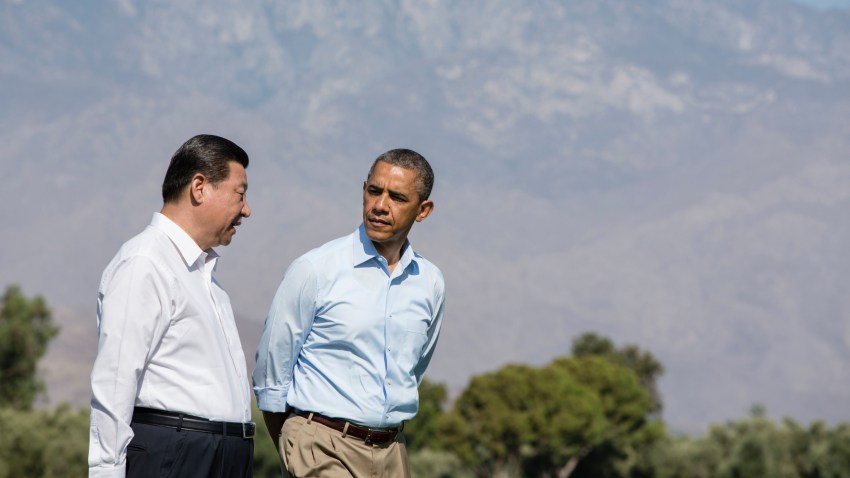One year into Xi Jinping’s presidency of China, it would be easy to despair about the current state of U.S.-China relations. U.S. Secretary of State John Kerry’s efforts to push cooperation with Beijing on North Korea and climate change have fallen well short of Washington’s ambitions. China’s search for a “new relationship among major powers” has yet to materialize into something of real substance. And sparks are flying as the United States and its allies contend with a China that appears determined to enforce its claim to contested areas in the East and South China Seas in increasingly provocative and dangerous ways.
Domestic politics in both countries, moreover, offer little hope for significant improvement in the near term. Xi is emerging as a Chinese strongman—consolidating his personal power, cracking down on freedom of expression on the Internet, presiding over a significant expansion not only of China’s military capabilities but also of its objectives and pushing forward on a bold—but as yet unrealized—economic reform package. While there is the potential over the mid to longer term for a stronger China to be a better partner for the United States, unless the economic reforms fulfill their promise, few of Xi’s initial policy innovations will move the country in a direction that promotes greater cooperation.
At the same time, President Barack Obama’s rebalance to Asia appears off-balance. Members of the U.S. military are speaking with different voices on both America’s understanding of China’s military objectives as well as the U.S. capacity to fulfill its obligations on the pivot. Maintaining a strong, cohesive U.S. military footing in Asia is essential, not only to support our allies as they deal with the reality of a far more assertive Chinese military, but also to advance our military-to-military cooperation with China. The economic pillar of the pivot is also in danger. Congress failed to provide the president with the trade promotion authority necessary to help ensure a smoother passage for the Trans-Pacific Partnership (TPP), and doubts are being cast on whether the White House will be able to get the job done despite the efforts of U.S. Trade Representative Michael Froman. Chinese officials from a number of government ministries and think tanks have indicated their interest in China eventually joining the TPP, a prospect that would greatly advance the U.S.-China relationship as well as the value of the TPP itself. U.S. credibility on both the trade and security fronts is now in doubt as a result of the lack of coherence and cohesiveness in Washington.
While Zhongnanhai and the White House try to navigate their respective domestic political thickets, each side needs to do its part to keep the relationship on track. In this regard, Gary Locke’s tenure as ambassador to China is instructive. Among his major accomplishments, he drastically reduced the number of days Chinese citizens must wait for a visa to travel to the United States—a small-sounding but truly significant achievement—and he calmly steered the embassy through several diplomatic crises, including the attempted defection of Chongqing police chief Wang Lijun and the escape from house arrest to the American Embassy of Chinese lawyer and human rights activist Chen Guangcheng.
There were no breakthroughs or breakout moments. Instead, there were small accomplishments that contributed to build a stronger foundation for the relationship. Such small cooperative efforts, in fact, are sprinkled throughout the bilateral relationship. On the security front, a contingent of Chinese soldiers—17 to be precise—will participate for the first time ever in the Cobra Gold military exercises, where they will help to build a temple school in northern Thailand. On climate change, there are a number of cooperative endeavors underway, such as aligning battery-charging standards for electric vehicles to assist automobile manufacturers by ensuring compatibility between the world’s two largest car markets. Trade and economic ties received a small boost with the resumption of negotiations on a bilateral investment treaty, and though subsequently hedged, China’s initial support for Ukrainian sovereignty over Crimea in the face of Russian intervention can be seen as a new area of potential agreement, if not explicit cooperation.
As Obama seeks to cement his foreign policy legacy during his second term in office, he needs to marshal his forces and devise his battle plan. He has made the rebalance to Asia a centerpiece of U.S. foreign policy, and it has become the prism through which actors in Asia, including China, understand Washington’s intentions. To fulfill the promise of the rebalance, however, the president needs to move out in front of his team to ensure that both the messaging and the policies are on track. No matter how many miles senior U.S. officials rack up between Washington and Beijing or various other capitals throughout the region, it will not compensate for a rebalance in disarray.
The bilateral relationship with China, meanwhile, will require, as always, an inordinate amount of effort for what appears to be little real payoff. Cabinet secretaries and other officials will continue to log thousands of miles in pursuit of cooperation. Victories will be small, but as Locke demonstrated, they can nonetheless be significant. As in any relationship, it bears remembering that the little things do matter.
Elizabeth Economy is the C.V. Starr senior fellow and director, Asia Studies at the Council on Foreign Relations.

